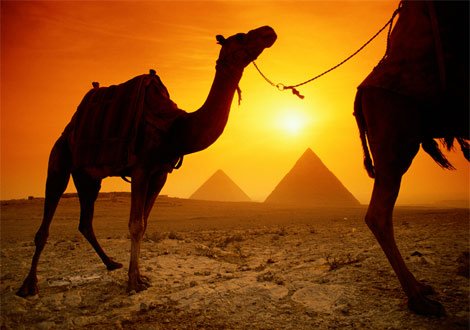
Many reports coming out of Egypt suggest the battle is not one for Islamic fundamentalist rule — so often the case in the Middle East — but rather one in favor of “liberty” and freedom from the rule of a 30-year presidency in which the leader refuses to ever step down.
If the reports are valid, then this is a rare opportunity for the American government to support the development of a democratic republic in that part of the world. Unlike Iraq, where components of such a republic were thrust upon the people through military action, in Egypt such a government could develop of, by and for the people.
Such leadership by the United States is unlikely, however. For decades now, the United States has been adrift from its own concepts of individual rights and the infrastructure of a democratic republic to support them. Big Government welfare programs and a regulatory state in which business operates only at the consent of government has replaced freedom and capitalism in the USA. Americans have, by and large, lost sight of what gives rise to liberty. So how can they possibly lead or support the Egyptians in their hour of crisis?
Maybe the Egyptians will teach Americans on this issue. To do so, there must be widespread agreement and coherent understanding of what “liberty” actually means. Liberty means more than freedom from a tyrant, or a dysfunctional five-term President. Americans at the time of the Revolutionary War in 1776 understood this, and were properly led by men like Thomas Jefferson. Liberty means the presence of individual rights. Individual rights do not include the things many Americans today demand, and probably many impoverished Egyptians will demand in the months and years to come. Liberty does not mean the right to material goods. It does not mean the right to a car, a house, clothing, or even food and medical care. In order to claim a “right” to any of these things, you’re claiming the right to force another (or others) to provide it for you. Take the example of socialized medicine. It may seem valid to ask, “How unreasonable is it that everyone have access to medical care?” OK, fine. But who’s going to pay for it? Or if nobody’s going to pay for it, then by what right do you force the doctor to provide it, even at the impoverishment of his own career or life? No answer is given, because these kinds of “rights” are seen as unquestionable absolutes. That’s increasingly the case in the United States, and my fear is that will be the case in Egypt, as well.
A major complaint coming out of Egypt is how poor the country is. To United States officials such as Barack Obama and Hillary Clinton, this will be blamed on the lack of proper wealth distribution in the country. Obama and Clinton, who just days before the riots seemed to find little wrong with the rule of Mubarak over Egypt, will suddenly now complain that “resources” (meaning: property) are not being properly spread throughout the society. Their premise will be the same as the autocrat stepping out of power: That property belongs to the government. They will argue that instead of Mubarak deciding how that property is to be distributed, another dictator — or even a committee of dictators, kind of like the previously Democratic Congress in the United States — will decide how that property is to be distributed. That, of course, leaves the door wide open to all manner of left-wing socialist dictatorships and right-wing religious fundamentalists, all of whom are more than happy to take over the country and decide who gets what.
None of this is liberty.
If Egypt wants to become a more prosperous nation, it’s right to overthrow its permanent President in favor of divided and limited government, such as we have in the three branches of government in the United States. But more will be needed to ensure prosperity. Capitalism will be needed. Capitalism means the principle of private ownership of the means of production, trade and property. Government must stay out, other than to uphold private property rights, punish violent criminals and thieves. Liberty for all the people will have to include liberty for people to create and maintain their wealth, investing it (or not) when and how they see fit, so long as they don’t defraud anybody. This is limited government at its best, how the United States operated during its first century of existence and why economic growth and prosperity were so robust during that time. As the United States became less of a capitalist nation in its second and third centuries, growth flattened and prosperity went into relative decline.
Economic prosperity, by the way, is the truest form of fairness. Although not everyone will have the same amount of property and wealth, everyone has the same and equal right to keep what he or she earns, not having it threatened by either open thieves or the legalized plunder of government. Whether they know it or not, this legalized plunder is what many of the Egyptians are rebelling against, as they watch their own government decide who gets what share of any existing prosperity — rather than letting the free market decide. If poverty is the Egyptians’ concern, they should demand the freedom of the marketplace and capitalism to create prosperity never before seen in their country.
It’s sad to see a nation of people assert itself, throwing off the shackles of Big Government with probably no idea with what to replace it. They can expect no guidance or perspective whatsoever from current United States officials. Barrack Obama and his administration might talk the game of “liberty,” but what they’re referring to is nothing at all like the liberty Thomas Jefferson, Ben Franklin, James Madison and George Washington had in mind.
